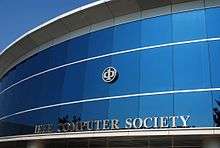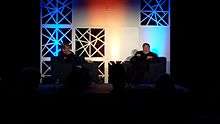IEEE Computer Society
IEEE Computer Society (sometimes abbreviated Computer Society or CS) is a professional society of the Institute of Electrical and Electronics Engineers (IEEE). Its purpose and scope is "to advance the theory, practice, and application of computer and information processing science and technology" and the "professional standing of its members."[2] The CS is the largest of 39 technical societies organized under the IEEE Technical Activities Board.[3]
| Founded | 1946[1] |
|---|---|
| Type | Professional organization |
| Focus | Computer and information processing science and technology |
| Headquarters | Washington, DC, United States |
| Origins | Formation of the American Institute of Electrical Engineers (AIEE) Subcommittee on Large-Scale Computing |
Area served | Worldwide |
| Method | Publications, conferences, technical councils, industry standards, certification, and training |
Key people | Cecilia Metra (Current President). Melissa Russell (Executive Director). |
Employees | 47 |
| Website | www |
The IEEE Computer Society sponsors workshops and conferences, publishes a variety of peer-reviewed literature, operates technical committees, and develops IEEE computing standards.[4] It supports more than 200 chapters worldwide[5] and participates in educational activities at all levels of the profession, including distance learning, accreditation of higher education programs in computer science, and professional certification in software engineering.[3]
The IEEE Computer Society is also a member organization of the Federation of Enterprise Architecture Professional Organizations (a worldwide association of professional organizations which have come together to provide a forum to standardize, professionalize, and otherwise advance the discipline of Enterprise Architecture).
History

The IEEE Computer Society traces its origins to the Subcommittee on Large-Scale Computing, established in 1946 by the American Institute of Electrical Engineers (AIEE),[6] and to the Professional Group on Electronic Computers (PGEC), established in 1951 by the Institute of Radio Engineers (IRE).[7] When the AIEE merged with the IRE in 1963 to form the Institute of Electrical and Electronics Engineers (IEEE), these two committees became the IEEE Computer Group.[8] The group established its own constitution and bylaws in 1971 to become the IEEE Computer Society.[1]
The CS maintains its headquarters in Washington, D.C. and additional offices in California, China, and Japan.[9]
Main activities

The IEEE Computer Society maintains volunteer boards in six program areas: education, membership, professional activities, publications, standards, and technical and conference activities. In addition, 12 standing committees administer activities such as the CS elections and its awards programs to recognize professional excellence.[10]
Education and professional development
The IEEE Computer Society participates in ongoing development of college computing curricula, jointly with the Association for Computing Machinery (ACM).[11] Other educational activities include software development certification programs[12] and online access to e-learning courseware and books.[13]
Publications
The IEEE Computer Society is a leading publisher of technical material in computing.[14] Its publications include 12 peer-reviewed technical magazines and 20 scholarly journals called Transactions, as well as conference proceedings, books, and a variety of digital products.[15]
The Computer Society Digital Library (CSDL) is the crown jewel of the Computer Society's digital assets and provides subscriber access to all CS publications, as well as conference proceedings and other papers, amounting to more than 750,000 pieces of content.[16]
As most publications were delivered digitally in 2014, the IEEE Computer Society launched the complementary monthly digest Computing Edge magazine, which consists of curated articles from its magazines.[17]
Technical conferences and activities

The IEEE Computer Society sponsors more than 170 technical conferences each year[18] and coordinates the operation of several technical committees, councils, and task forces.[19]
The IEEE Computer Society also maintains 12 standards committees to develop IEEE standards in various areas of computer and software engineering (e.g., the Design Automation Standards Committee and the IEEE 802 LAN/MAN Standards Committee).[20]
In 2010, the IEEE Computer Society introduced Special Technical Communities (STCs) as a new way for members to develop communities focusing on selected technical areas.[21] Current topics include broadening participation, cloud computing, education, eGov, haptics, multicore, operating systems, smart grids, social networking, sustainable computing, systems engineering, and wearable and ubiquitous technologies.[22]
Technical committees
The IEEE Computer Society currently has 31 technical committees and two technical councils.[23] A technical committee (TC) is an international network of professionals with common interests in computer hardware, software, its applications, and interdisciplinary fields within the umbrella of the IEEE Computer Society. A technical council is essentially a very large technical committee, and a task force is an emerging technology committee. A TC serves as the focal point of the various technical activities within a technical discipline which influences the standards development, conferences, publications, and educational activities of the IEEE Computer Society. Following are the current technical committees and councils:
- Technical Committee on Business Informatics and Systems (TCBIS)
- Technical Committee on Computer Architecture (TCCA)
- Technical Committee on Computational Life Sciences (TCCLS)
- Technical Committee on Computer Communications (TCCC)
- Technical Committee on Data Engineering (TCDE)
- Technical Committee on Dependable Computing and Fault Tolerance (TCFT)
- Technical Committee on Digital Libraries (TCDL)
- Technical Committee on Distributed Processing (TCDP)
- Technical Committee on Intelligent Informatics (TCII)
- Technical Committee on Internet (TCI)
- Technical Committee on Learning Technology (TCLT)
- Technical Committee on Mathematical Foundations of Computing (TCMF)
- Technical Committee on Microprocessors and Microcomputers (TCMM)
- Technical Committee on Microprogramming and Microarchitecture (TCuARCH)
- Technical Committee on Multimedia Computing (TCMC)
- Technical Committee on Multiple-Valued Logic (TCMVL)
- Technical Committee on Pattern Analysis and Machine Intelligence (TCPAMI)
- Technical Committee on Parallel Processing (TCPP)
- Technical Committee on Real-Time Systems (TCRTS)
- Technical Committee on Scalable Computing (TCSC)
- Technical Committee on Security and Privacy (TCSP)
- Technical Committee on Semantic Computing (TCSEM)
- Technical Committee on Services Computing (TCSVC)
- Technical Committee on Simulation (TCSIM)
- Technical Committee on Visualization and Graphics (VGTC)
- Technical Committee on VLSI[24] (TCVLSI)
- Technical Council on Software Engineering (TCSE)
- Technical Council on Test Technology (TTTC)
Awards
The IEEE Computer Society recognizes outstanding work by computer professionals who advance the field in three areas of achievement: Technical Awards (e.g., the IEEE Computer Pioneer Award or the W. Wallace McDowell Award), Education Awards (e.g., Taylor L. Booth Education Award), and Service Awards (e.g., Richard E. Merwin Distinguished Service Award).[25]
In 2018, the organization won First Place in the Los Angeles Press Club’s annual Southern California Journalism Awards for "Untold Stories: Setting the Record Straight on Tech's Racial History," by digital editor Michael Martinez and senior writer Lori Cameron, in the minority/immigration reporting online category. The awards saw record entries from around the world in 2018 from the biggest publishing, broadcasting, online, and media outlets.
See also
- Association for Computing Machinery
- Association of Information Technology Professionals
- Australian Computer Society
- British Computer Society
- Canadian Information Processing Society
- Computer Society of India
- IEEE Technical Activities Board
- Institute of Electrical and Electronics Engineers
- Institution of Analysts and Programmers
- ISCA Influential Paper Award
- New Zealand Computer Society
References
- Wood, Helen: "Computer Society Celebrates 50 Years," IEEE Annals of the History of Computing, 17(4):6, 1996
- IEEE Computer Society Constitution & Bylaws, art. 1, Sec. 2, 1971
- "About the IEEE Computer Society". IEEE Computer Society. Retrieved 30 August 2011.
- Weiss, Eric A., "Institute of Electrical and Electronics Engineers--Computer Society (IEEE-CS)," Encyclopedia of Computer Science, 4th ed., John Wiley & Sons, 2003, p. 881–882
- "Professional Chapters". IEEE Computer Society. Retrieved 2 September 2011.
- Concordia, Charles: "In the Beginning There Was the AIEE Committee on Computing Devices," Computer, 9(12):42–44 December 1976
- Astrahan, Morton M., "In the Beginning There Was the IRE Professional Group on Electronic Computers," Computer, 9(12):43–44, December 1976
- Weiss, Eric A., "Institute of Electrical and Electronics Engineers--Computer Society (IEEE-CS)," Encyclopedia of Computer Science, 4th ed., John Wiley & Sons, 2003, p. 881
- "IEEE Computer Society Offices". IEEE Computer Society. Retrieved 30 August 2011.
- IEEE Computer Society Bylaws, Article VI–XII, 2011
- "Computing Curriculum: Computer Science 2013 (CS2013)". ACM/IEEE-CS Joint Task Force. Retrieved 2 September 2011.
- "Professional and Educational Activities Board". IEEE Computer Society. Retrieved 2 September 2011.
- "e-Learning Campus". IEEE Computer Society. Retrieved 2 September 2011.
- Weiss, Eric A., "Institute of Electrical and Electronics Engineers--Computer Society (IEEE-CS)," Encyclopedia of Computer Science, 4th ed., Nature Publishing Group, 2000, p. 882–883
- "IEEE Computer Society Publications". IEEE Computer Society. Retrieved 30 August 2011.
- "Digital Library". IEEE Computer Society.
- "IEEE Computer Society Introduces Computing Edge". 1888pressrelease.com. Retrieved 4 April 2015.
- "Conference Calendar". IEEE Computer Society. Retrieved 2 September 2011.
- "Technical Activities". IEEE Computer Society. Retrieved 30 August 2011.
- "Standards Activities Board". IEEE Computer Society. Retrieved 2 September 2011.
- Dejan S. Milojicic, Phil Laplante, "Special Technical Communities," IEEE Computer, vol. 44, no. 6, pp. 84-88, June, 2011.
- IEEE CS STC Web site
- Technical Committees of IEEE-CS
- TCVLSI
- "IEEE Computer Society Awards". IEEE Computer Society. Retrieved 2 September 2011.